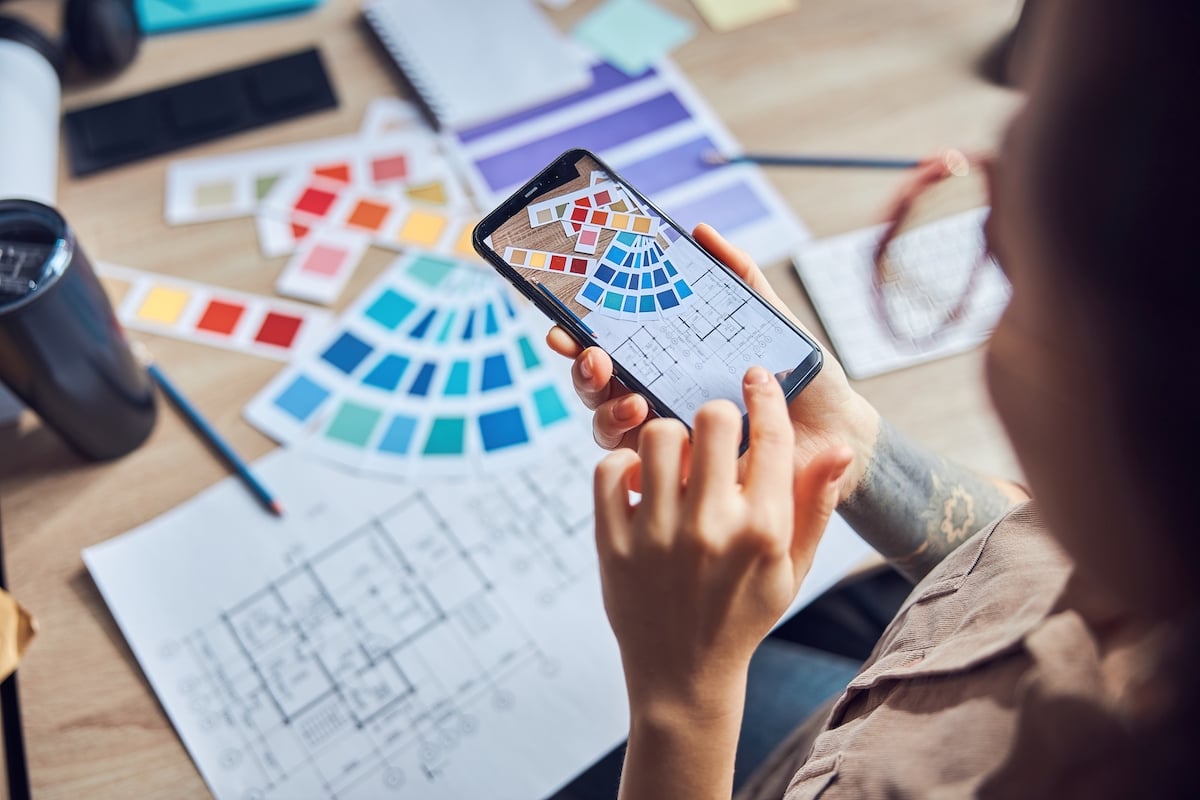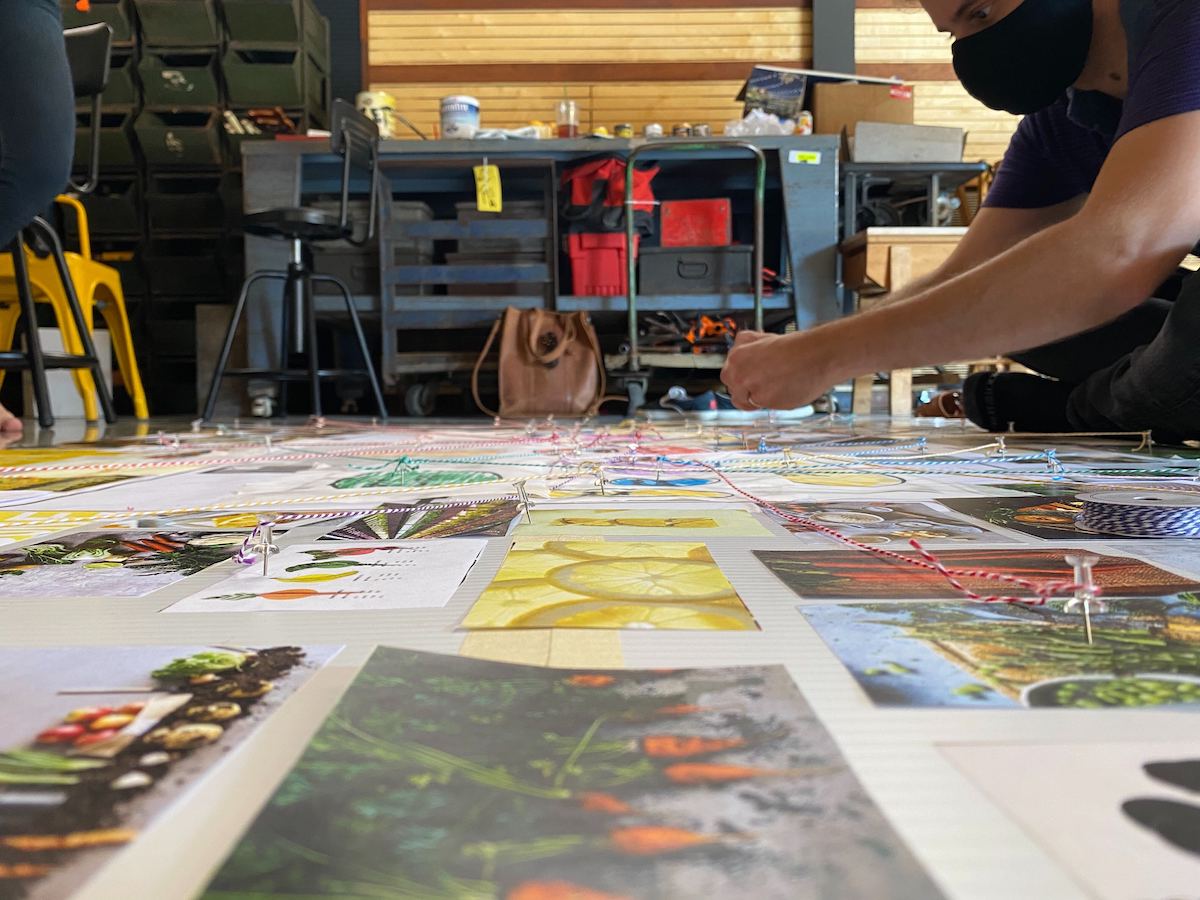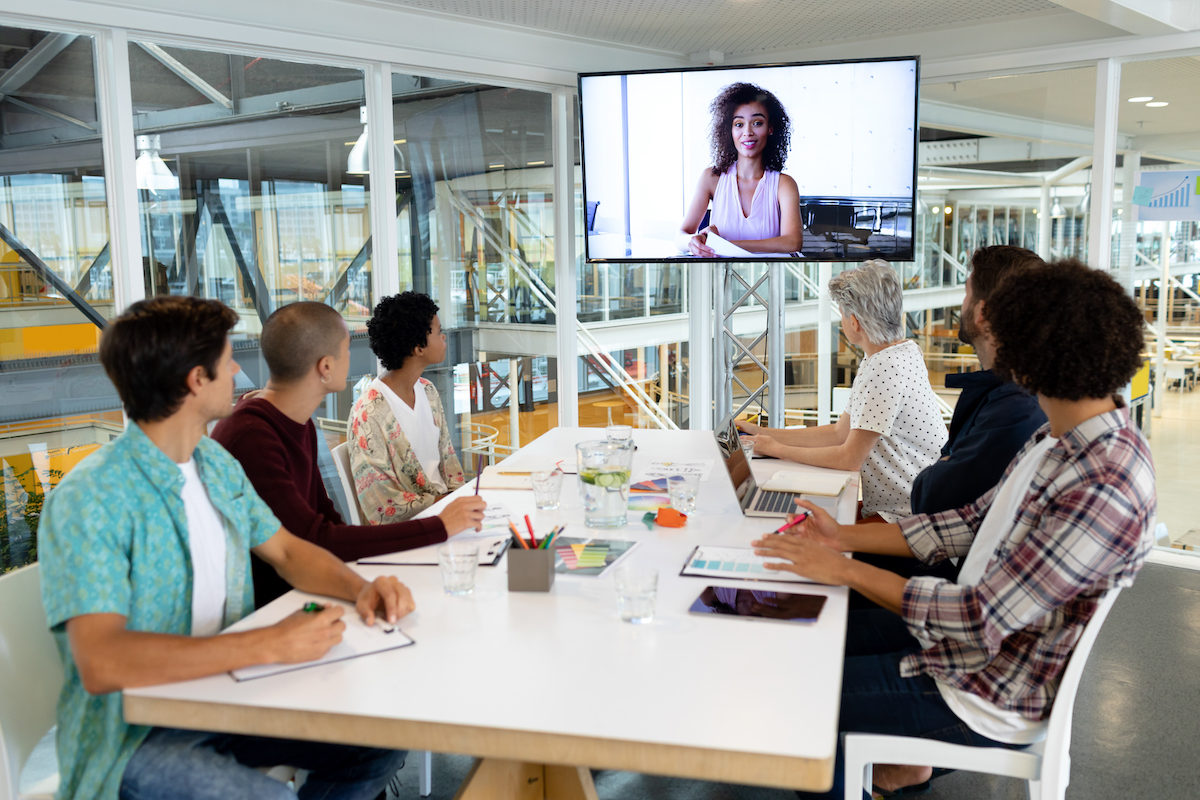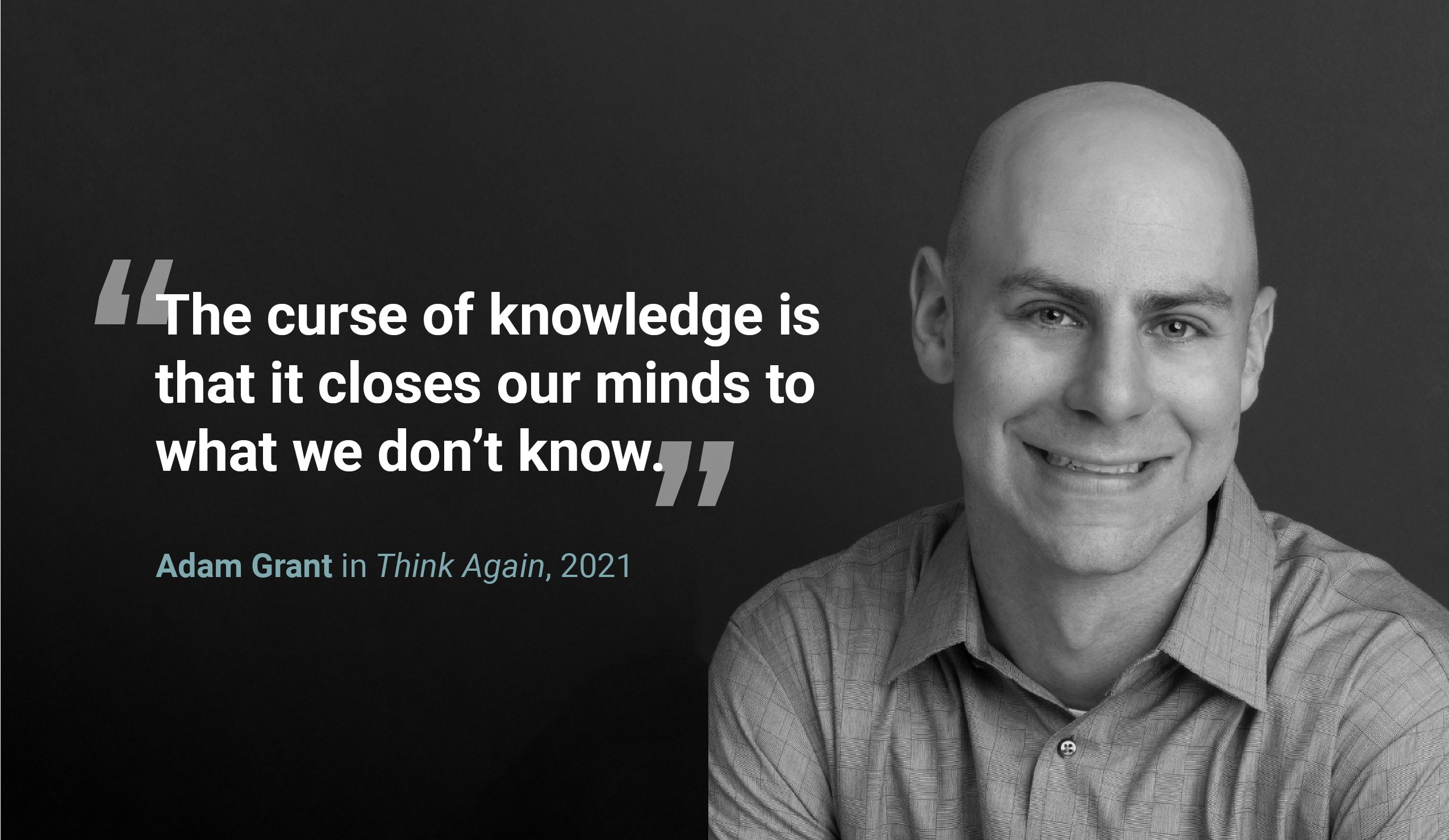
In his new book, Think Again, Adam Grant shares that while past competitive advantage was about thinking faster or out running your competitors, today’s competitive advantage will instead be about rethinking and unlearning what we’ve always known to be true. With the accelerating pace of change, the whole book is an inspiring invitation to let go of views and entrenched processes that are no longer serving us well and prize mental flexibility, humility, and curiosity over foolish consistency.
If knowledge is power, knowing what we don't know is wisdom. This is where Clubhouse comes in.
What is Clubhouse?
Haven’t heard of it? Per the New York Times, it’s the newest, buzziest, audio-only social media platform. It’s like a podcast that you can interact with live. And, because it’s still currently invite-only, only available on the Apple platform, and generally not recorded for playback, it creates a great deal of FOMO. Although it’s been around for a little over a year, due to recent celebrity adoption and our culture’s current starvation for connection amidst COVID-19 lockdowns, the platform went from 3.5 million downloads as of February 1, to 8.1 million by Feb 16, 2021. While other social media platforms, like Tik Tok, have seen similar exponential growth during COVID-19, Clubhouse, in my humble opinion, has great PROFESSIONAL appeal.
Why should I care?
Now, I know what you’re thinking: Do I really need ANOTHER social media platform? ANOTHER “thing to do?” I thought the same thing. But hear me out: We can’t write inspired songs if we are all listening to the same radio stations. And, in the last year of “social distancing” (which Rex Miller, in a recent conversation with ThinkLab, argues should have been called “physical distancing” instead, because the term itself underlines the problem), I think we are all missing our passive professional connections more than ever. So, perhaps it’s time to invite new ones.
At the turn of the last century, the great hope for the internet was that it would expose us to different views. But as the web welcomed a few billion fresh voices and vantage points into the conversation, it also became a weapon of misinformation and disinformation. - Think Again, Chapter 8
Here’s what makes me excited for what it could bring to the interiors industry:
- It expands exposure to people and perspectives. While many social media platforms have, unfortunately, strengthened the divide in our society by allowing us to only surround ourselves with those who think, vote, and even look like us, Clubhouse is a truly democratized platform allowing anyone with a common interest to “take the stage,” share opinions, and discuss. You may notice the diversity in the “rooms” exceeds that of other professional and personal circles. And, in this day and age of diversity, equity, and inclusion, gaining new perspective is paramount to developing empathy.
- It expands exposure to information. While most social media platforms are focused on a certain level of polish or expressing a confident point of view (thought leadership), Clubhouse is focused on the step before that: vulnerably exploring and developing that point of view. Think of Clubhouse as the place to humbly ask and explore, not pontificate. In the absence of spontaneous connections, with one click of a button, Clubhouse gives you a platform to GET exposed and make connections without having to swap out your track suit. In this way it also drives DEEP authenticity; the interactions are tough to script or polish, so what you see is what you get.
- It makes new connections within the industry and beyond. So far in ThinkLab’s short history as Clubhouse moderators, we have had competing manufacturers take the stage for a productive discussion about vertical market growth. As we have explored other “rooms” within the platforms, we have connected with market researchers across to discuss topics important to us with researchers across the globe (like survey fatigue amidst COVID-19). Imagine what connections YOU could make with no travel, no awkward introductory emails, and in less time than clicking on a calendar invite.
How to get started on Clubhouse
Now, if you are compelled to start, here's how to do it one step at a time.
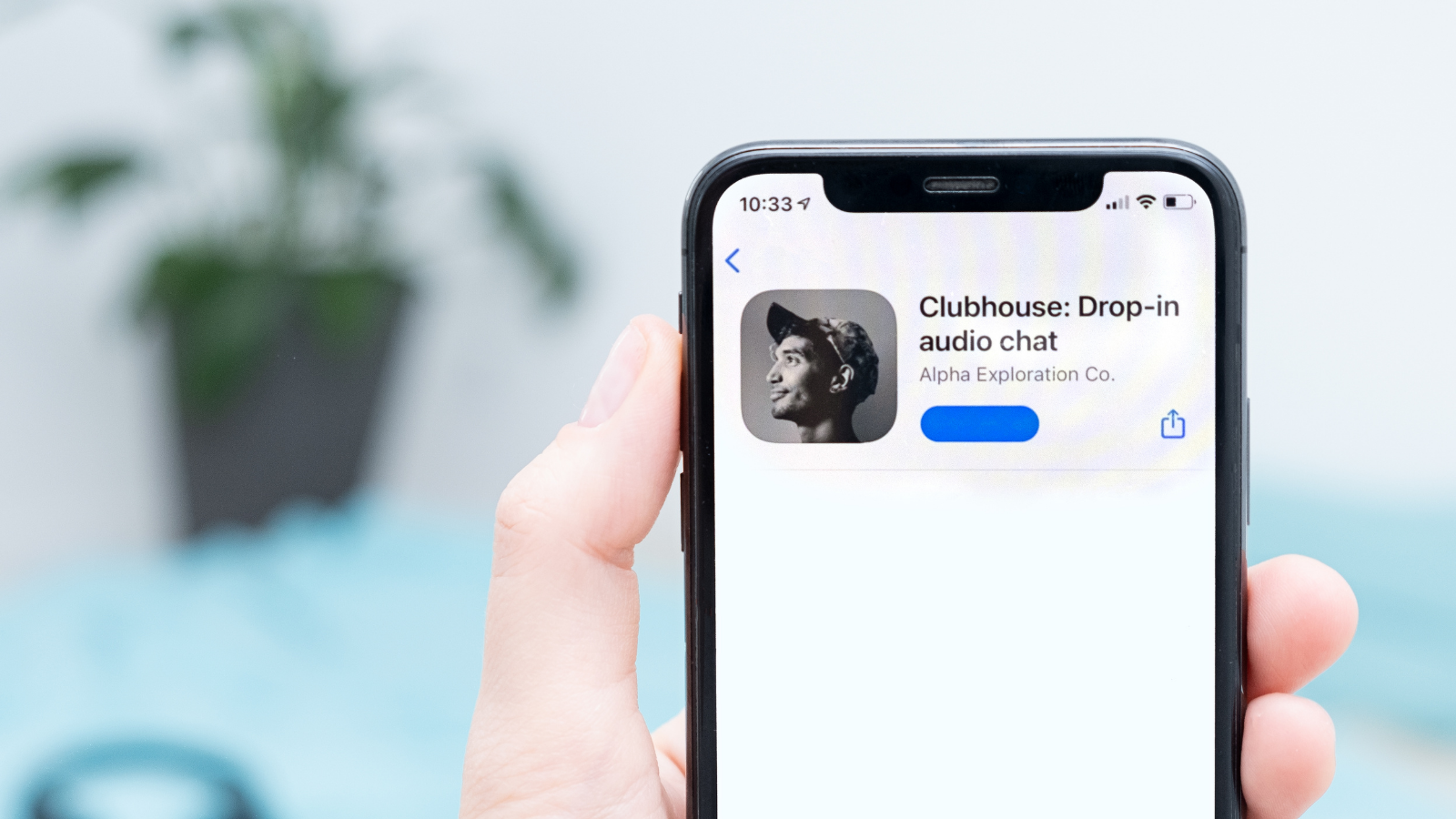
- STEP 1: First you have to download the app. The platform is available to iPhone and Android users.
- STEP 2 (Optional): Take this tutorial. (You’ll thank us later; it only takes 15 minutes.)
- STEP 3: Start by joining in-industry clubs. While the point of this is to make NEW connections, it helps to start someplace familiar. Even though residential designers are flocking to Clubhouse, adoption is not as fast just yet for the commercial side of the industry. But ThinkLab is working to develop a welcoming community of familiar faces to start, from which we hope you expand.
Find our club: Design + Data w/ThinkLab, where each week we share a data point underlining industry evolution and invite conversation. Occasionally editors from Interior Design and Metropolis join our Friday 9:00 am EST coffee chats.
Other in-industry clubs include:
Architecture & Design hosted by architect and YouTuber, Tim Ung, focused on the love of design and the legacy they want to leave behind.
Business of Homes club is active and fascinating. (This resi-focused publication that has lots of juicy insights about the business of design.)
Contract Interiors, hosted by Sid Meadows, focuses on topics that matter to distributors.
Driving Designers, hosted by Catherine Minervini and Julie Barfuss, focuses on networking and making personal connections, especially for those looking for their next steps.
There are many more on architecture and “design” but note that many use the word “design” ubiquitously to mean UX design.
Furniture & Design and Furniture Sales Reps club is hosted by Stephen Viscusi, CEO of The Viscusi Group, a retainer-based search practice dedicated to the global recruitment of personnel in the interior furnishings industry.
Update for Driving Designers: is hosted by Catherine Minervini, Julie Barfuss and Sarah McNally, and is designed to bring together the commercial interiors industry to create enthusiastic conversations, connections, and community.
New content for Design for Health™ Club: is hosted by Sarah McNally, and is here to advance human health and well-being in the built environment: empowering brands, architects & designers, and vendors to connect, collaborate and inspire.
How to connect with ThinkLab on Clubhouse
- STEP 1: Find our club, Design + Data w/ThinkLab and click "FOLLOW."
- STEP 2: Swipe left on the UP NEXT section to see all upcoming sessions.
- STEP 3: When you see a session that interests you, click the BELL ICON to be notified when it is live. Additionally, you can tap on a session title to see an expanded description and add it to your calendar by clicking the ADD TO CAL icon.
- STEP 4: Tune in on Friday mornings at 9:00am EST to listen to the chat – or contribute to the conversation!
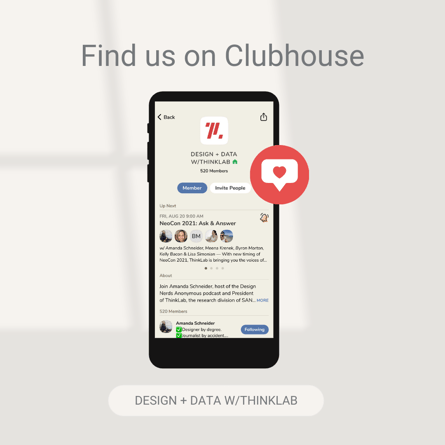
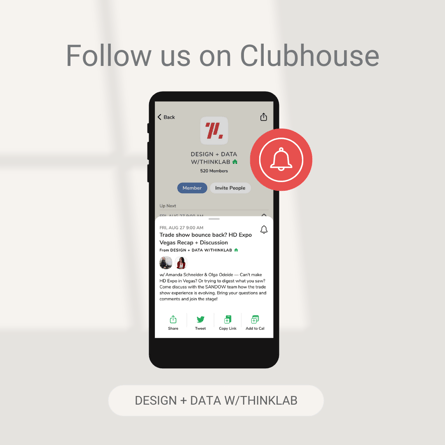
Up Next on Design + Data w/ThinkLab Clubhouse:
8/27 – Trade Show Bounce Back? HD Expo Recap + Discussion
We’d love to hear from you on Fridays at 9:00am ET!
So is Clubhouse a flash in the pan, or the next big thing?
Put simply: we’re not sure. But, perhaps it’s what we all need right now. As Forbes social media blogger John Brandon says in his review, “This immediacy (everything is live) and passivity (I can just listen and not interact) is a good match for remote work because we’re already not adhering to normal schedules. Sometimes it feels like I’m in a parked car and driving in the fast lane at the same time.
With apps like Clubhouse that promote passive interaction, it feels like you have your hand on the pause button at all times. (Zoom fatigue occurs when we can’t hit pause, or at least we feel dumb when we do.) We can be social, or we can be passive, or we can drop out entirely.”
Amanda Schneider is President of ThinkLab, the research division of SANDOW. At ThinkLab, we combine SANDOW Media’s incredible reach to the architecture and design community through brands like Interior Design Media, Metropolis, Luxe, and Material Bank with proven market research techniques to uncover relevant trends and opportunities for the design industry. Join in to explore what’s next at thinklab.design/join-in.
